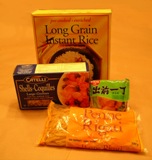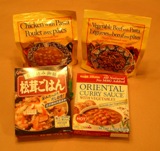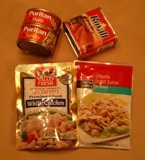| Food Basics |
Nutrition
Most outdoor adventures require a great deal of energy, which in turn you
need to increase your daily food intake to approximately 4,000 calories.
The energy source breakdown should be roughly 50% carbohydrates, 25% proteins
and 25% fats.
In winter / cold conditions, it should be 20% carbohydrates, 25% proteins and 45% fats.
Why ? To keep your body warm in the cold, you will need a vast energy source. Fats will
generally take much longer to be digested, and hence will produce more and lasting energy
for you.
Carbohydrates (sugars & starch) are provided by foods such as bread, pasta, rice,
fruits and vegetables. These are easily digested by your body and need to be frequently
replenished if energy is continuously being expended.
|

|
|
Pasta, Rice or
Instant Noodles
are the typical
carbohydrates
we bring to the backcountry.
Try using different shapes of pasta to encourage appetite.
|
|
You may consider to add soup mixes into your pasta.
Also try using some of those pre-packaged oriental sauce mixes,
or curry paste with rice. They are really good.
|
|

|
|
Proteins are provided by foods such as meat, fish, nuts (especially almonds),
whole grains, soy beans, egg, cheese and milk. Proteins are more difficult to digest
than carbohydrates. However they release more energy slowly and provide the amino
acids for tissue building.
|
|
|
| |
Fats are provided by foods such as oil, margarine, bacon, cheese and nuts.
Fats are the most concentrated form of energy. They are as difficult to digest as
proteins, so not too much fat should be eaten at any one time.
|
Canned meats are the most common sources of proteins and fats in backcountry cooking.
I found these new tin-foil packaged chicken and tina in grocery store
last year, which greatly reduces the weight.
|
|

|
|
Minerals / Vitamins: Generally, if you make use of whole grains, cereals,
dried fruits, nuts and seeds, your body will be adequately supplied with most of the
necessary minerals and vitamins. The only major deficiency frequently found in
camping foods is Vitamin C. This can be remedied by bringing fruit drink crystals
with added Vitamin C in it.
Fibres fundamentally do not provide any energy for you. They help you clean up your
digestive system so that you can continue to take in more food. Lack of fibres in your trail
food may cause constipation. A person will feel less energetic and lose his apetite, and
therefore be unable to digest other foods to give them the energy. Instant oatmeal or cream of
wheat are the best sources for fibres while you are on trail.
|
|